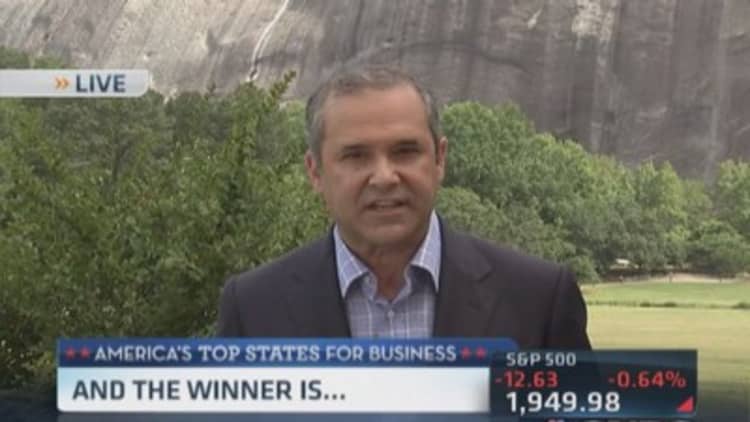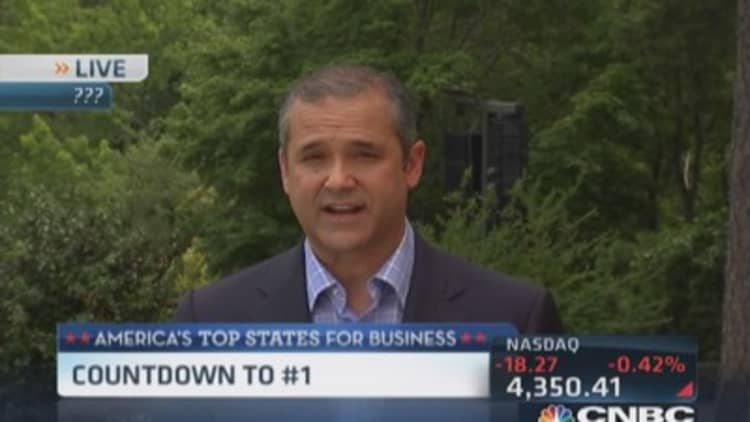To tell the story about recent job creation on a state-by-state basis in this country, you have to start with North Dakota. One of the plain states, its employment picture is anything but, thanks to the shale oil boom. North Dakota boasts a 2.6 percent unemployment rate (as of June 2014) and is in the enviable position of having to fill what a state marketing campaign crows are 20,000 jobs.
The Rough Rider state leads the other 49 in job creation over the last year, growing jobs at a healthy 5.2 percent clip from April of 2013 to April of 2014. Many of the other states are seeing similar, if not quite as spectacular, job growth, as they appear to finally be getting their footing after stumbling badly during the Great Recession. Unlike North Dakota, though, these states are merely regaining ground they lost in the last seven years.
Read MoreA 2014 scorecard on how America's states stack up
"In 2013, carrying forward from 2012, growth has become more broad-based geographically, " said Professor Stephen Brown, a director of the Center for Business and Economic Research at the University of Nevada, Las Vegas.



Having suffered greatly as the state's housing boom evaporated and the recession hit its leisure-and-gaming industries, the number of jobs in Nevada has increased 3.8 percent from April of last year to April of 2014.
Brown said the state has regained about half the jobs it lost during the recession, thanks to hiring in leisure and gaming, retails and professional services. Many of the jobs the state has yet to recover are in construction, an industry he does not expect to be hiring a lot anytime soon.
"We still have an excess inventory of houses," he said.
A housing rebound kickstarts jobs
Typically, it is construction that helps lead a state out of a recession, but when Florida found itself floundering when its housing market went belly-up, it could not rely on it to prime the economic pump.
Read MoreState winners and losers in the jobs war
"We had a huge inventory of unsold homes in the area, so the legislature had to be careful about the kinds of things they crafted," said Amy Baker, director of Florida's Office of Economic and Demographic Research. "So they did a number of very targeted things that looked to promote job creation."
Almost seven years since the recession, Florida's rate of job growth was third behind North Dakota's and Nevada's, at 3.2 percent.
Baker said Florida was lucky in some sense as some big industries like health services never faltered in the recession, and continued to hire through the downturn. Now that the national economy is picking up, so too is job creation in important industries for the state, like tourism.
For Washington State, aerospace has always been important industry, thanks to Boeing. And just as demand around the world has climbed for new aircraft, so too has Boeing's demand for new workers.
"That's been a big driver; tech is a big driver," said Steve Lerch, executive director of the Washington State Economic and Revenue Forecast Council. "We've seen gains in biotech, and we have some pretty good gains in nontraditional retail."
Economic diversity is a driver
Nontraditional retail would be Amazon and other Internet retailers based in the state, where the 2.2 percent rate of job growth ranked sixth among the 50 states.
"We're back above prerecession employment levels," said Lerch. "One thing we've seen coming out of the recession is the job losses in the Seattle metro areas were deeper than in the rest of the state, but that pattern has been flipped on its head, and now Seattle is adding a lot more jobs than the rest of the state."
Read MoreWhy are space companies flocking to Colorado?
A diverse economy should provide states with some protection, but in New Mexico, which along with Virginia saw job losses in the last year, not only is the economy not diverse enough but the sectors themselves are not very deep.
In the year ending April, six of its major industries—manufacturing, business services, construction, government, information services and miscellaneous services—lost jobs.
New Mexico's woes tied to its dependence on the state, federal and municipal governments, which employ about a quarter of the state's workers, as well as to Intel,which is a big player in its otherwise weak manufacturing sector.
—By CNBC's Mary Thompson





